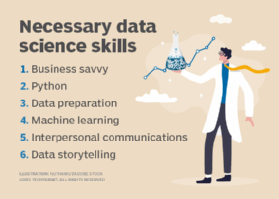
metamorworks - stock.adobe.com
Tips to prep for a data science interview
Interviewing is an important first step toward a data science job. Here's advice for what questions to expect and how a little research can help with the technical screening.
When interviewing for a job, data scientists need to consider how to showcase both their technical acumen and soft skills to potential employers. Data science interview prep should start by considering the target company, the kinds of questions they might ask and how to highlight your appropriate strengths.
The best data scientists build effective models, use appropriate techniques for different kinds of problems and strategize about augmenting data sets. Data scientists must also be excellent communicators with business intuition, have a boardroom presence, and be able to build strong teams to support them.
"It is essential to understand the role and what is expected of data scientists before the interviewing process begins," said Vivek Ravisankar, CEO at HackerRank.
Key data science skills
Maintaining clean, extensive data sets is the biggest challenge in many data science projects. Sachin Gupta, CEO of HackerEarth, recommends data scientists review their strengths in four key skills: programming, statistics and probability, machine learning and data analysis. Interviewers will commonly ask questions on these topics, such as the following:
- Programming: Given an array of unsorted random numbers (decimals) find the interquartile distance.
- Statistics and probability: Say you roll three dice, one by one. What is the probability that you obtain three numbers in a strictly increasing order?
- Machine learning: Let's say you have a categorical variable with thousands of distinct values. How would you encode it?
- Data analysis: Given a table on user actions, write a query to get the active user retention by month.
Gupta recommends practicing programming questions across different topics. It's also helpful to practice system design questions and coding during pair interviews with your peers.
"That way you will be more confident during the final interview," he said.
Potential data scientists should also consider refining their soft skills since data scientists are required to work cross-functionally across organizations and must know how to communicate with their colleagues. This will not only help candidates shine in the interview process but will set them up for success in the role itself.
Before interviewing
Another aspect of data scientist interview prep consists of understanding the potential employer.
Magda Klimkiewicz, an HR business partner at Bold LLC, recommends checking the About Us page and reading up on the prospective company on Glassdoor before the interview. Be sure to read through the organization's core values, vision and mission statements to get a taste of what the employer might be looking for in candidates.
"If you can prove to employers you understand their business and their coding needs, they'll throw job offers at your feet," she said.

Before the interview process begins, you should look at specific questions you might be expected to answer in preparation of the technical screening process. Jen Hsin, head of data science at SetSail, suggests reading through the job description to identify which data scientist profile the hiring team is looking for.
Some of the possible profiles may include descriptions similar to these:
- Statistician/researcher. Roles and responsibilities might mention A/B experiments, hypothesis testing, user studies, etc. In this case, you might get asked about experiment design, sample size estimate, confidence interval calculation, and when to accept or reject a hypothesis based on measurement.
- ML scientist. Roles and responsibilities might mention building machine learning models to solve a business problem or enhance product features. One might get asked about their prior ML experience: What problem have you tried to solve with machine learning? What algorithm(s) did you consider and use? Why is this algorithm suitable for the problem compared to other options? How do you evaluate model performance? What is the real-life impact of the model?
- NLP or computer vision specialist. Roles and responsibilities might specifically mention text or image processing experience. In this case, familiarity with modern deep learning methods is a must. Questions could include: What new developments are you particularly excited about? Which new AI model just got released that you are about to try out?
Preparing for the interview
Jennifer Raimone, director of career and student support for Metis, recommends getting into the habit of finding out more about the company during the initial phone screen.
"It's surprising how many job seekers are afraid to ask what the interview process entails, but understandably so since we aren't really taught how to navigate this process," she said.
Here are some good questions to ask during the initial phone screen:
- What is the timeline for filling the role?
- Is the position new or backfilled?
- What does the interview process entail?
- What is your preferred communication style for follow-up and status updates?
Asking about their timeline helps you schedule your time better so you are not overworked and can be your best self. If the position is backfilled, you can think about what skills to highlight. Asking the steps in the interview process helps you prepare technically, and understanding their communication style can help you to manage your expectations.
Sean Downes, Ph.D. director at the Pasayten Institute, recommends brainstorming the kinds of problems that the organization might face and charting out possible concrete problems with concrete solutions. For example, a social networking company might be seeking ways to curate the best clusters on a graph; a retail company might want help setting up or improving a recommendation system.
Part of your data science interview prep could include writing this up in a chart to use as a formula sheet on a phone call to remind you of any important details that might otherwise be lost in the heat of the interview. It may also be helpful to create a map with related problems you have worked on that includes details for the packages or methods you used, what worked, and what did not.
Preparing for the technical review
For the technical interview, it's good to brush up on your ability to write complex SQL queries and prepare for simple data processing-oriented coding exercises that involve writing a script, said Rudy Zen, head of product at Fast AF Inc. These exercises are meant to mirror the technical skills needed for a day in the life of a data scientist.
Sample SQL questions could include how you would handle data aggregations by group, windowing functions such as ranking, complex joins and subqueries. Consider looking at sample SQL exercises and going through them; this can be especially effective to prepare if you aren't using SQL regularly.
Paul Bilodeau, CEO and co-founder of Filtered.ai, recommends finding people that work at the company you are interviewing for on LinkedIn. Then, take a look at what they have listed as the projects they're working on and the current tools they're working with.
You might also want to explore what they are posting on Twitter and GitHub, which can help you know what topic you want to review.
It's also worth considering the kinds of problems the interviewer might be working on. For example, if you are interviewing for a position that skews toward data analysis, know the difference between basic distributions cold, and know what they're used for. If you're interviewing for a position that skews toward machine learning, be prepared to explain what models you've used and be prepared to talk about problems with deployment.
"Most technical questions they have will likely stem from the things they're actively working on," Downes said.








